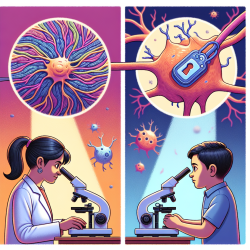Understanding Neuroinflammation: A Key to Better Outcomes
Neuroinflammation is a significant factor in the progression of neurodegenerative disorders (NDs), which include Alzheimer's disease, Parkinson's disease, amyotrophic lateral sclerosis, and Huntington's disease. These disorders are characterized by the gradual degradation of neurons, leading to cognitive deterioration and motor dysfunction. The research article titled "Neuroinflammation in Neurodegenerative Disorders: Current Knowledge and Therapeutic Implications" provides insights into the role of neuroinflammation in these disorders and the potential therapeutic implications.
Key Findings from the Research
The research highlights that neuroinflammation is not only a consequence but also a potential initiator of NDs. This dual role makes it a critical target for therapeutic interventions. Anti-inflammatory drugs have shown promise in preclinical models, but their clinical efficacy remains questionable. This underscores the need for further research to understand the complex interplay between neuroinflammation and NDs.
Implications for Practitioners
For practitioners, particularly those working with children in online therapy settings like TinyEYE, understanding the implications of neuroinflammation can enhance therapeutic strategies. Here are some actionable insights:
- Stay Informed: Keep abreast of the latest research on neuroinflammation and its role in neurodegenerative disorders. This knowledge can inform your therapeutic approaches and help you make data-driven decisions.
- Advocate for Research: Encourage further research into the role of neuroinflammation in childhood developmental disorders. Understanding these mechanisms could lead to better therapeutic interventions.
- Collaborate with Researchers: Engage with researchers to explore how findings from studies on neuroinflammation can be applied to improve outcomes for children receiving online therapy.
Encouraging Further Research
While the current research provides valuable insights, there is a need for more studies to explore the specific pathways through which neuroinflammation affects neurodevelopment in children. Practitioners can play a crucial role in this by participating in research studies and sharing clinical observations that could inform future research directions.
Conclusion
The research on neuroinflammation in neurodegenerative disorders offers promising avenues for improving therapeutic outcomes. By integrating these insights into practice, practitioners can enhance their effectiveness in supporting children with developmental challenges. Continued research and collaboration between practitioners and researchers are essential to unlock the full potential of these findings.
To read the original research paper, please follow this link: Neuroinflammation in Neurodegenerative Disorders: Current Knowledge and Therapeutic Implications.










